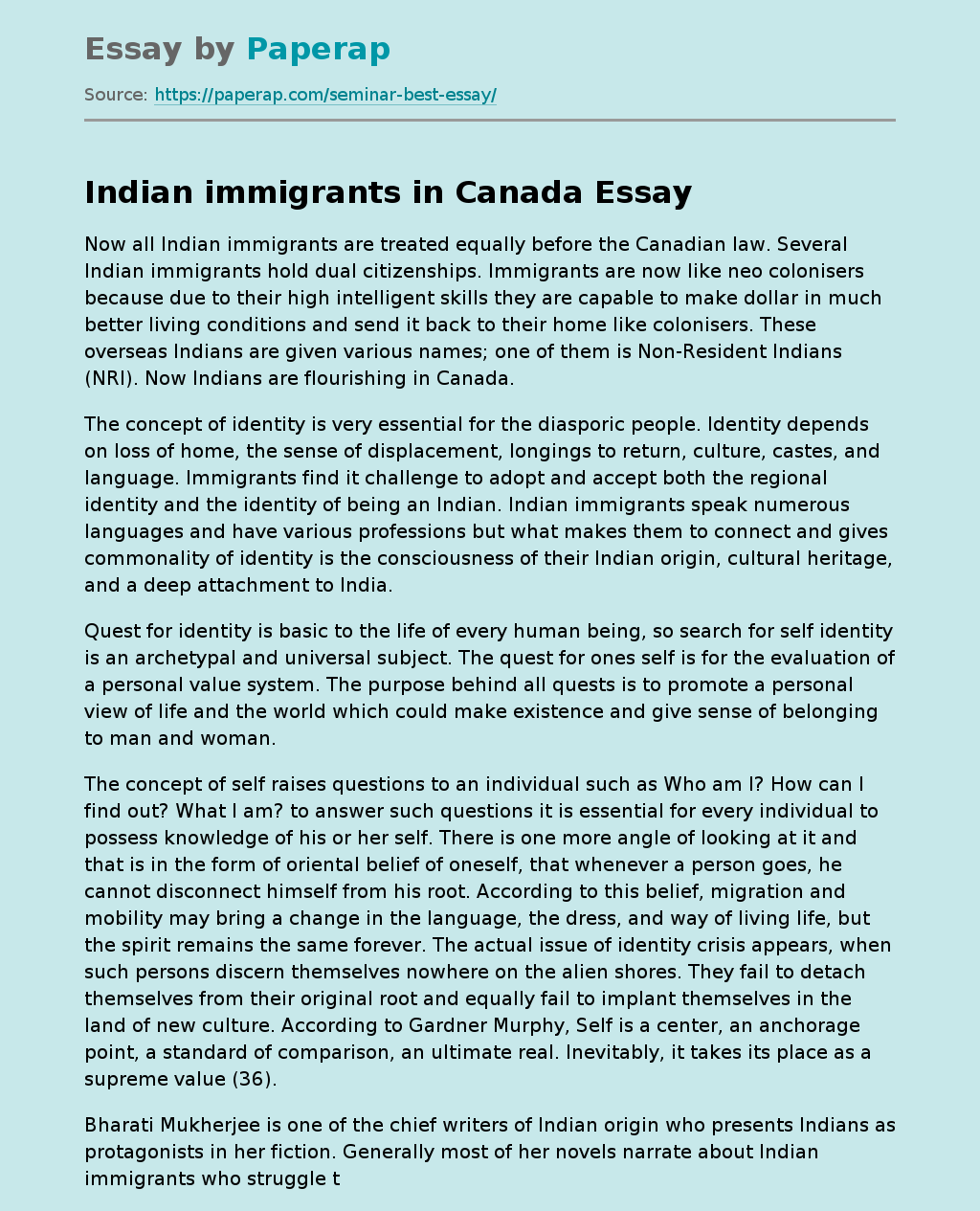Indian Immigrants In Canada
The following sample essay on Indian immigrants are treated equally before the Canadian law. Several Indian immigrants hold dual citizenships. Immigrants are now like neo colonisers because due to their high intelligent skills they are capable to make dollar in much better living conditions and send it back to their home like colonisers. These overseas Indians are given various names; one of them is Non-Resident Indians (NRI). Now Indians are flourishing in Canada.
The concept of identity is very essential for the diasporic people.
Identity depends on loss of home, the sense of displacement, longings to return, culture, castes, and language. Immigrants find it challenge to adopt and accept both the regional identity and the identity of being an Indian. Indian immigrants speak numerous languages and have various professions but what makes them to connect and gives commonality of identity is the consciousness of their Indian origin, cultural heritage, and a deep attachment to India. Quest for identity is basic to the life of every human being, so search for self identity is an archetypal and universal subject.
The quest for ones self is for the evaluation of a personal value system. The purpose behind all quests is to promote a personal view of life and the world which could make existence and give sense of belonging to man and woman.
The concept of self raises questions to an individual such as Who am I? How can I find out? What I am? to answer such questions it is essential for every individual to possess knowledge of his or her self.
There is one more angle of looking at it and that is in the form of oriental belief of oneself, that whenever a person goes, he cannot disconnect himself from his root. According to this belief, migration and mobility may bring a change in the language, the dress, and way of living life, but the spirit remains the same forever. The actual issue of identity crisis appears, when such persons discern themselves nowhere on the alien shores. They fail to detach themselves from their original root and equally fail to implant themselves in the land of new culture. According to Gardner Murphy, Self is a center, an anchorage point, a standard of comparison, an ultimate real. Inevitably, it takes its place as a supreme value .
Bharati Mukherjee is one of the chief writers of Indian origin who presents Indians as protagonists in her fiction. Generally most of her novels narrate about Indian immigrants who struggle to settle in an alien country like America. Her main theme throughout her writing focuses on the condition of Asian immigrants in North America. Each character, caught in the tension of demand and desire, represents different characteristics of feminism and displacement. Wife (1975) where in dimple in torn between her dual role of a western woman of independence and that of a slavish Indian wife. She depicts the mental breakdown of a weak-minded young woman who becomes a prey for western culture and undergoes a traumatic experience of immigration from the patriarchal structured society of India to the liberated society of America. The middleman and other stories (1988) she highlights the immigrant experience on the whole. Jasmine () she shows the possibilities of remaking oneself in the new world.
Jhumpa Lahiri is one of the most celebrated American writers of Indian origin. Her writing explores an immigrant experience and identity of self. Her novels and collection of short stories she depicts the life experiences of immigrants. In The Namesake (2003) the female protagonist who immigrate with her husband, suffer not only the insecurity in the culture that is alien to her but also she caught between the two world that give rise to a kind of suffocation resulting from her inability for adaptation in the new world. The sense of exile and nostalgia for the homeland is very well exhibited by Jhumpa Lahiri in this novel. Her collection of short stories brings forth the sensitive dilemmas faced by Indians or Indians immigrants with themes like marital difficulties, human relationships, and the disconnection between first and second generation us immigrants. Interpreter of Maladies (1999) she address sensitive dilemmas in the lives of Indian immigrants settled in USA.
Manju Kapur is one of the living dynamic writers in Indian English Literature was born on October 25, 1948 at Amritsar in Punjab. She did her M.A. in English from Dalhouise University in Halifax, Nova Scotia, Canada and then she did her M.Phil from Delhi University. She has taught English Literature under the name Manju Kapur Dalmia in Miranda House, Delhi University for fourteen years from where she had her under graduation. She took voluntary retirement to devote herself completely to produce creative writing in English. She is married to Gun Nidhi Dalmia who belongs to the affluent family of Dalmias. She has three daughters, names amba, maya, and katyayani and a son name agastya. She currently lives in New Delhi with her husband and children.
Kapur has produced many valuable feminist novels. Her first novel, Difficult Daughters (1998) which won international acclaim with the commonwealth writers prize for the first book and this novel earns her substantial success, both commercially and critically, in India as well as abroad. It has been translated into several languages like Spanish, Dutch, German, Greek and Italian. Her second novel, A Married Woman (2002) won shortlisted for Encore Award. Her third novel, Home (2006) was shortlisted for Hutch Crossword Award. Her fourth novel, The Immigrant (2008) has been long listed for the DSC Prize for South Asian Literature in 2010 and India Plaza Golden Quill Award. Her fifth novel, Custody (2011) and this novel telecasted on several Indian television channels in various language. Besides novels, she also has written a number of short stories but Chocolate (2001) is widely read story.
Indian Immigrants In Canada. (2019, Dec 14). Retrieved from https://paperap.com/seminar-best-essay/

